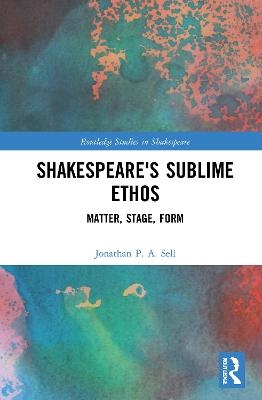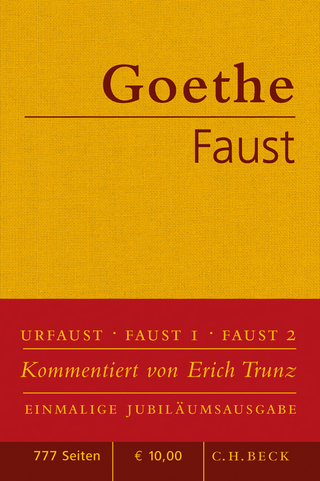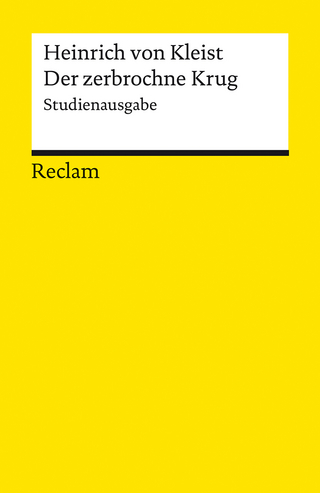
Shakespeare's Sublime Ethos
Routledge (Verlag)
978-1-032-01814-0 (ISBN)
Winner of the AEDEAN "Enrique García Díez" Literature Research Award 2023
Winner of the European Society for the Study of English Book Award 2024
Shakespeare’s Sublime Ethos: Matter, Stage, Form breaks new ground in providing a sustained, demystifying treatment of its subject and looking for answers to basic questions regarding the creation, experience, aesthetics and philosophy of Shakespearean sublimity. More specifically, it explores how Shakespeare generates a sublime mood or ethos which predisposes audiences intellectually and emotionally for the full experience of sublime pathos, explored in the companion volume, Shakespeare’s Sublime Pathos. To do so, it examines Shakespeare’s invention of sublime matter, his exploitation of the special characteristics of the Elizabethan stage, and his dramaturgical and formal simulacra of absolute space and time. In the process, it considers Shakespeare’s conception of the universe and man’s place in it and uncovers the epistemological and existential implications of key aspects of his art. As the argument unfolds, a case is made for a transhistorically baroque Shakespeare whose "bastard art" enables the dramatic restoration of an original innocence where ignorance really is bliss. Taken together, Shakespeare’s Sublime Ethos and Shakespeare’s Sublime Pathos show how Shakespearean drama integrates matter and spirit on hierarchical planes of cognition and argue that, ultimately, his is an immanent sublimity of the here-and-now enfolding a transcendence which may be imagined, simulated or evoked, but never achieved.
Jonathan P. A. Sell is Professor of English Literature at the Universidad de Alcalá, Spain. He holds degrees from the universities of Oxford, London and Alcalá, and his main fields of research are early modern and contemporary literature. He has written numerous articles and several books, including Rhetoric and Wonder in English Travel Writing, 1560–1613 (2006), Allusion, Identity and Community (2012) and Conocer a Shakespeare [Getting to Know Shakespeare] (2012).
Introduction
Aside
"With reason to admire"
Plan of the work
Chapter 1. On the Sublime
Quod erat demonstrandum
Replotting the sublime
The early modern sublime
Plato, Longinus, and the Christian sublime
Some notes on the sublime
Chapter 2. "Brightest heaven of invention": Sublime Topics
Ethos and the sublime gestalt
Sublime cues and "strong expressions"
Sublime phenomena
"Outstretched heroes"
Counterfeit metaphysics
Chapter 3. "The fairy way of writing": Sublime Matter
"The hateful incredible"
The sublime and the wonderful
The tyranny of knowledge
Chapter 4. "’Twixt heaven and earth": Sublime Scenography
The sublime stage
Perspective/Scenography
The dangerous edge
The art of intermediacy
Chapter 5. Divine Mechanisms: Sublime Form and Shape
"Irregularities of genius"
Poems unlimited
Divinity bursts forth
No clocks in Rome [Entre’acte]
"Awful parenthesis"
"The very body of the time"
"Fissures of sublimity"
Chapter 6. Bastard Art, Innocent Experience
Wood clearing
The art of the blemish
Atomism, atheism, aesthetics
Sublimity and beauty
"Damned custom", primal nescience
"Fairing the foul"
Child father
Conclusions: Shakespeare’s Sublime Ethos
| Erscheinungsdatum | 02.08.2021 |
|---|---|
| Reihe/Serie | Routledge Studies in Shakespeare |
| Verlagsort | London |
| Sprache | englisch |
| Maße | 152 x 229 mm |
| Gewicht | 489 g |
| Themenwelt | Literatur ► Lyrik / Dramatik ► Dramatik / Theater |
| Geisteswissenschaften ► Sprach- / Literaturwissenschaft ► Anglistik / Amerikanistik | |
| Geisteswissenschaften ► Sprach- / Literaturwissenschaft ► Literaturgeschichte | |
| Geisteswissenschaften ► Sprach- / Literaturwissenschaft ► Literaturwissenschaft | |
| ISBN-10 | 1-032-01814-3 / 1032018143 |
| ISBN-13 | 978-1-032-01814-0 / 9781032018140 |
| Zustand | Neuware |
| Haben Sie eine Frage zum Produkt? |
aus dem Bereich


